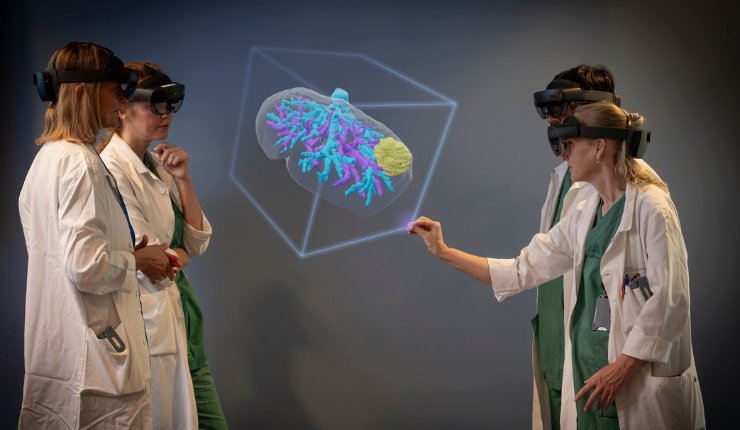HoloSurge awarded €8.9 million Horizon Europe grant to improve surgical planning with hologram technology

One of the largest EU grants in recent history has been awarded to HoloSurge, a four-year project bringing together 14 European leaders in technology and healthcare research with a shared goal to reduce the risk of complications during planned surgery.
The 8.9 million EUR grant, allocated by transnational research and innovation funding body Horizon Europe, will fund the further development of organ hologram technology to power informed surgical decision-making.
This technology, developed by Norwegian medtech company HoloCare, currently provides liver surgeons with interactive 3D holograms of organs, and is used by doctors to plan and tailor operations to each person’s individual anatomy.
With a funding pot of approximately 80 billion GBP, the Horizon Europe programme focuses on advancing research projects centred on three fundamental pillars: excellent science, industrial leadership and societal challenges.
Crucially for the NHS, there are opportunities for health research and innovation funding across all three pillars of the Horizon Europe programme. The group says the funding secured by the HoloSurge partnership represents an exciting opportunity for the UK to collaborate with European scientific leaders, to advance national healthcare services, despite its decision to leave the EU in 2020.
The technology is initially being used for liver surgeries at five hospitals in Europe, including Leeds Teaching Hospital Trust. So far, trials show a 74% reduction in the time taken to align organs during surgery using HoloCare’s AR images versus MRI scans according to the group.
Using augmented reality headsets, such as the Microsoft HoloLens, surgeons are able to view a 3D hologram of a patient’s organ to plan operations more efficiently and accurately. The tool also allows them to move, rotate and expand the hologram, so that the organ can be viewed from above, below and behind.
Colleagues wearing the headsets can access and interact with the hologram at the same time, whether they’re in the same room or connecting remotely from different locations. HoloCare says this allows multi-disciplinary teams to tap into the knowledge of external specialists, regarding potential surgical challenges, enhancing decision-making during the planning process.
The company says that in the future, it will be possible for the holograms to be superimposed onto the patient during the surgery itself as a reference point to improve accuracy and intraoperative navigation.
Currently, surgery is the main treatment for liver cancer, with the potential to extend some patients’ lives by up to 10 years. If surgery isn’t an option, patients may undergo palliative chemotherapy, which typically offers around 3 years of survival.
HoloCare says the holographic technology is set to significantly improve both the surgical process and the decision-making before surgery, potentially reducing complications. This includes issues such as infection, bleeding, organ damage and death – which currently affect up to 48% of liver surgeries and 60% of pancreatic surgeries.
Read more: Surgical hologram tech launches into Leeds Teaching Hospitals NHS Trust
Due to their two-dimensional nature, traditional imaging methods, such as ultrasound, MRI and CT scans, can also result in surgeons missing critical details. Around 40% of all lesions in the tail of the pancreas currently go unnoticed using ultrasound technology.
Over a four-year period, the 14 HoloSurge partners will support the integration of the cutting-edge hologram technology into existing surgical workflows. The team will ensure regulatory compliance, clinical validation, and technical optimisation for widespread adoption in liver and pancreatic cancer surgeries.
“The Holocare technology is an exciting advance in how we treat cancer patients with the potential to transform surgical care. The superior anatomical knowledge gained from the technology will enable more precise surgery with better cancer outcomes for patients,” said Professor David Jayne, Professor of Surgery at the University of Leeds and Hon. Consultant Surgeon at Leeds Teaching Hospitals NHS Trust.
Dr Thomas Lango, Chief Scientist at St. Olavs Hospital and SINTEF in Trondheim, Norway added: “The fusion of available data sources (CT, MR, ultrasound) into holograms made available for clinicians in minimally invasive procedures like laparoscopic surgery and flexible endoscopy will change the way clinicians work in the future. It will empower clinicians to navigate intricate anatomical landscapes with unprecedented precision and 3D understanding not readily available from traditional cross sectional 2D images. The HoloCare technology promises to not only improve image-guided medical procedures, but also collaboration and training of new experts.”
Jahn Otto, Innovation Director at HoloCare said: “Innovation has long been the foundation for prosperity in Europe, from the breakthroughs improving healthcare to the technological advances growing our economy. In essence, Horizon Europe is not just about funding; it’s about forging connections, driving innovation, and shaping the future of healthcare. This not only opens doors for collaboration with the EU but also with Norway.
“The HoloSurge partnership stands as a testament to this. Through joint efforts with experts from the EU, UK and Norway, we’re aiming to use our hologram technology to transform the surgical outcomes of individuals worldwide. Our hope is that it can be adapted to benefit a wider range of surgeries in the future.”
Related
EU denies picking on US tech giants, says US also…
BRUSSELS (Reuters) - Europe's new tech rule aims to keep digital markets
€450M to drive green data infrastructure, the next startup hub,…
This week we tracked more than 70 tech funding deals worth over €1.3 billion, and over 5 exits, M&A transactions, rumours, an
European tech sector poised for stronger 2025, says Monument Group;…
Let’s kick things off with tech! Monument Group’s Zac Williams expects a big spike in European technology deals in 2025, as the region offers more appealing
Women still marginalised in Europe’s Tech Ecosystem
European startups founded or co-founded by women raised €10.2B in 2024 across nearly 2,000 transactions, according to Pitchbook’s latest study. This repr










